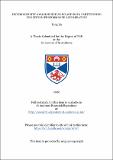Heterogeneity-aware scheduling and data partitioning for system performance acceleration
Abstract
Over the past decade, heterogeneous processors and accelerators have become increasingly prevalent in modern computing systems. Compared with previous homogeneous parallel machines, the hardware heterogeneity in modern systems provides new opportunities and challenges for performance acceleration. Classic operating systems optimisation problems such as task scheduling, and application-specific optimisation techniques such as the adaptive data partitioning of parallel algorithms, are both required to work together to address hardware heterogeneity.
Significant effort has been invested in this problem, but either focuses on a specific type of heterogeneous systems or algorithm, or a high-level framework without insight into the difference in heterogeneity between different types of system. A general software framework is required, which can not only be adapted to multiple types of systems and workloads, but is also equipped with the techniques to address a variety of hardware heterogeneity.
This thesis presents approaches to design general heterogeneity-aware software frameworks for system performance acceleration. It covers a wide variety of systems, including an OS scheduler targeting on-chip asymmetric multi-core processors (AMPs) on mobile devices, a hierarchical many-core supercomputer and multi-FPGA systems for high performance computing (HPC) centers. Considering heterogeneity from on-chip AMPs, such as thread criticality, core sensitivity, and relative fairness, it suggests a collaborative based approach to co-design the task selector and core allocator on OS scheduler. Considering the typical sources of heterogeneity in HPC systems, such as the memory hierarchy, bandwidth limitations and asymmetric physical connection, it proposes an application-specific automatic data partitioning method for a modern supercomputer, and a topological-ranking heuristic based schedule for a multi-FPGA based reconfigurable cluster.
Experiments on both a full system simulator (GEM5) and real systems (Sunway Taihulight Supercomputer and Xilinx Multi-FPGA based clusters) demonstrate the significant advantages of the suggested approaches compared against the state-of-the-art on variety of workloads.
Type
Thesis, PhD Doctor of Philosophy
Collections
Items in the St Andrews Research Repository are protected by copyright, with all rights reserved, unless otherwise indicated.

